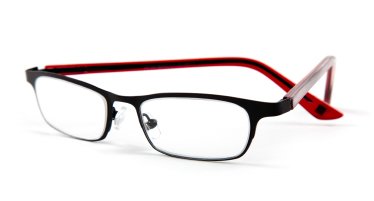|
How to Choose Eyeglasses
 So, it’s time for a new pair of glasses! So, it’s time for a new pair of glasses!
Your first thought will likely be, “what will they look like?” And certainly, appearance is essential. After all, your eyeglasses are part of your wardrobe! But eyeglasses should also provide optimum function as well as fashion. To avoid what might otherwise be a confusing process, allow us to offer the following guide:
Step 1: Carefully Choose a Frame
There is an endless array of choices of frame materials and though they may have a “designer” label or trademarked with compelling descriptions of durability, examine the construction and materials to make the right choice.
- Is the frame material durable enough for your personal use, but priced within your budget? Twistable (such as flexon) and Titanium are the most durable- but also slightly more expensive. Other frames are made of alloy materials and though designed for durability, some people can be allergic to the metals used.
- Where was the frame made? Typically frames from Europe and Japan offer the finest quality while frames from Korea or the Middle East may not offer the same quality.
- Is the frame guaranteed? Quality frames are generally guaranteed by the manufacturer for at least one year.
- Does the design an weight of the frame meet your lifestyle? If you tend to take your glasses on and off frequently, leave them in a pocket or otherwise wear them while you are engaged in physical activity – you may consider a more durable frame.
Step 2: Consider the Material of the Lens
The term “glasses” can be a bit of a misnomer when it comes to lens material. Today, many materials can be used to fabricate your lens:
- True glass is most resistant to scratching but even tempered glass can be dangerous if broken. Glass tends to be the heaviest material as well.
- Plastic lenses will be much lighter but also scratch easier.
- High index lenses, though a bit more expensive, can be ground thinner for heavier prescriptions.
- Polycarbonate lenses are extraordinarily durable and ideal for children for that reason. They may be more prone to scratching but are also less expensive than other so called “thin lenses”.
- Consider your need for photosensitive lenses. Note that tinted lenses will not darken when driving since UV light is blocked by most windshields.
- Choose whether you want “line” or “no line” if you require multifocals. When choosing “progressive” lenses (no line), it is advisable to choose the highest quality lenses such as Varilux and Zeiss, since quality is key during the intricate fabrication process.
Step 3: Assure a Professional Fit
The best possible fit for your glasses starts with careful, professional measurement. You may be surprised to find that most people’s faces are not symmetrical and require various adjustments to accommodate a comfortable fit. Once your glasses have been constructed, your optics professional will also offer “fine tuning” to assure that your glasses will stay in place, be comfortable and provide the vision clarity for which they were intended.
Come to our in-house optical shop and meet Tim Murphy, our Licensed Optician. He will expertly guide you in selecting the right frame, the right lens and the right fit for your lifestyle.
- Generous selection of frames
- Quality lens material
- Lenses fabricated in our own lab
- Sunglasses
|

